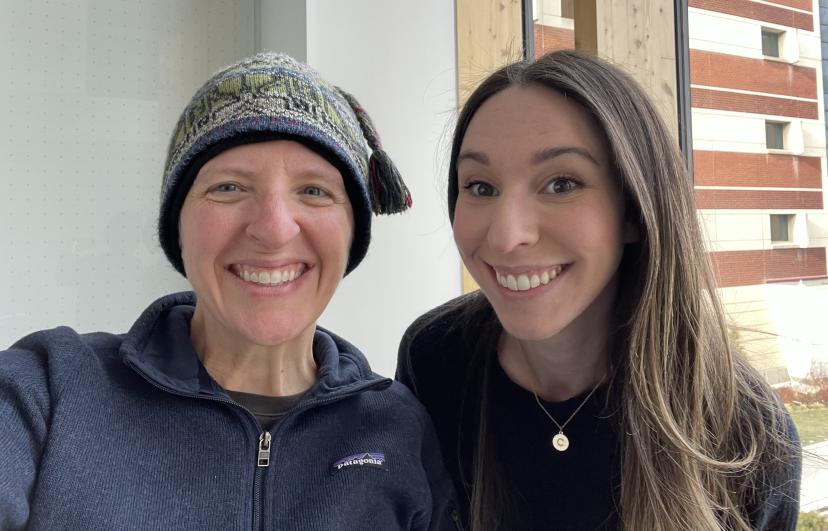
Trainee Connect Mentor - Mentee Relationship Continues
The CERA TraineeHub program supports the research and career goals of trainees and early career scholars of all disciplines with an interest in the ethical, legal, and social implications of genetics and genomics. Back in September of 2021, TraineeHub launched Trainee Connect, a mentorship program, and linked sixteen trainees with more established ELSI researchers for the purposes of enhancing trainee research. The program was a response to the need for mentorship identified by TraineeHub trainees and matching decisions were based on a survey of trainees and their stated goals for the mentorship opportunity.
We recently had the opportunity to check in with one of these mentor and mentee pairs, Jennifer K. Wagner, who is an Assistant Professor of Law, Policy, and Engineering and Anthropology at Penn State University and her Trainee Connect mentee, Caitlin Maloney, a doctoral student in the Department of Anthropology at Penn State. We were thrilled to find out that their relationship has continued for over three years. In the interview that follows, we asked Dr. Wagner and Caitlin to reflect on their motivations for making the connection and share some advice for others who might be considering becoming a mentor or mentee in ELSI.
CERA: Dr. Wagner, how do you describe your mentoring style?
Dr. Wagner: I would say that my mentoring style is to be a trusted, supportive confidant who offers my mentees an environment of psychological safety in which they can explore possibilities openly and grow personally and professionally without fear of judgment. Such candid discussions require some degree of mutual vulnerability, but I believe that vulnerability is essential for an impactful mentor-mentee relationship. Overall, I would say that my style values flexibility (adapting my tactics to the needs and interests of the mentee), empowerment (encouraging mentees to take ownership of their decisions and development), active listening (giving my undivided attention to help understand my mentees’ aspirations and concerns), and constructive feedback (offering honest insights and guidance to help mentees strengthen their own skills). My mentoring style also involves a balance of empathy and high-performance expectations for my mentees.
CERA: That’s great! Thank you for sharing those values. Could you also tell us if you have had any experiences as a mentee?
Dr. Wagner: I have a rather unique professional identity and multidisciplinary career, and I’ve been fortunate to have several highly influential mentors in different critical moments, disciplines, and aspects of my life. All of those relationships have instilled upon me a profound sense of responsibility to be generous with my time and expertise and a deep commitment to help support others similarly on their own professional journeys.
CERA: What do you think it takes to have a successful mentor/mentee relationship?
Dr. Wagner: As I mentioned in my response to the first question, I believe a successful mentor-mentee relationship requires trust, honest communication, and mutual vulnerability.
Caitlin: I would preface my response by saying that success will not look the same for every partnership. Initial goal setting is critical so the mentor and mentee can both define what success looks like to them and recognize when they have succeeded in meeting milestones and goals. Dr. Wagner outlined important principles that should provide the basis for a mutually beneficial relationship. To that, I would add mutual respect and appreciation. The mentor-mentee relationship requires considerable investment from both persons, and I’ve found more meaningful mentorship from those who value my goals and contributions.
CERA: Caitlin, what motivated you to get mentorship in ELSI research?
Caitlin: My motivation to seek mentorship in ELSI research was largely a product of timing. I was about to start my MPH program when CERA launched Trainee Connect, a networking program designed to purposely pair ELSI trainees and scholars. I requested to be connected with Dr. Wagner and was thrilled when she expressed interest in developing a mentor-mentee relationship. Trainee Connect requested a 6-month commitment, but Dr. Wagner and I met over the course of two years. We developed a foundation of mutual trust and respect that set the stage for continued mentorship and Dr. Wagner is currently my PhD advisor.
CERA: Wow, what a great outcome! What kinds of things would you recommend a mentee do to ensure they get the most out of the mentor/mentee relationship?
Caitlin: In addition to goal setting and respect, we get the most out of the mentor-mentee relationship when we are receptive to feedback. Taking initiative is critical throughout the partnership and when we seek constructive feedback in particular, we take an active role in our professional development.
CERA: What advice do you have for anyone who isn’t sure they would benefit from being mentored or being a mentor?
Dr. Wagner: If you are thinking about being a mentor but aren’t sure about “what’s in it for you,” then I think it is a horribly wrong time to try being a mentor and, instead, it’s a wonderful time to consider being mentored. A short-term, goal-oriented mentorship experience could help you explore what you personally value and hope to gain from mentorship, consider how you might approach mentorship, and also understand better who you might mentor and why. I see mentorship as offering mutual benefits to mentors and mentees, and know that I have grown professionally through my experiences as a mentor. For me, mentee questions have prompted meaningful self-reflection and helped reignite my passions in specific ELSI research areas.
Caitlin: If someone is questioning the benefit of being mentored, I think it is an opportunity to reflect on what they perceive as limitations or interferences to sustaining a relationship with each respective mentor. People might be weary if they have had negative experiences with mentorship or may be hesitant if they are at a professional crossroads. Identifying the root of uncertainty can be a starting point for the mentor-mentee relationship. I try to remind myself that by stepping outside my comfort zone and building these relationships, I’m making space for unimaginable opportunities.
CERA: Why do you think it is important to establish and promote a culture of mentorship in the ELSI field? What will it look like when we are successful?
Dr. Wagner: The ELSI field tries to bridge multiple disciplines, so mentorship is tremendously important to ensure that professionals and trainees alike have an informed vantage point from which to appreciate the ever-changing opportunities and challenges for multidisciplinary, interdisciplinary, and transdisciplinary ELSI work. I also think that a culture of mentorship could help encourage cooperative, collaborative approaches to ELSI. Signs of success could be everything from improved career satisfaction and retention of trainees and scholars in this field to an increase in innovative research and impact of our work.
Caitlin: I echo Dr. Wagner’s point about the significance of mentorship when bridging disciplines. As an ELSI trainee, I found that my interdisciplinary background and research interests could be confusing to people who trained within a single discipline. Fortunately, Dr. Wagner has been in my corner since the beginning of my journey into the ELSI field; she has provided invaluable guidance on navigating different spaces and the importance of ELSI scholarship and mentorship. Building ELSIhub is also a step towards our field’s success. Since ELSI topics span disciplines, having a central place to find new resources and reach out to ELSI scholars has empowered me to keep looking forward in my research.
We are excited to hear updates from other Trainee Connect pairs. Please reach out to Deanne Dolan at [email protected] to share your experience with us.


